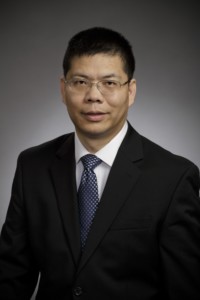PRAIRIE VIEW, Texas (October 18, 2022) — Dr. Hongbo Du, Ph.D., a Research Scientist at the Center for Energy & Environmental Sustainability (CEES), Prairie View A&M University (PVAMU), was awarded $500,000 by the National Science Foundation Historically Black Colleges and Universities – Excellence in Research program for his research project “Hybrid Ceramic Membrane Bioreactor and Reverse Osmosis Processes for the removal of Micro and Nano plastics from Municipal Wastewater.”
The collaborative project includes two co-principal investigators, Raghava Kommalapati, Ph.D., Director of CEES, endowed professor in the civil engineering department; and, Nabila Shamim, Ph.D., assistant professor in the chemical engineering department.
Dr. Kommalapati, who has prior NSF-EiR funding and is Dr. Du’s supervisor, said, “Du is one of the team members that is playing a critical role in the growth of research in our center. EiR is a great program that helps universities like ours build expertise and infrastructure so we can compete with other major universities. Our CEES team, including Du, has more than $2M in funding in addition to the CREST center funding of $5M over the last couple of years. And Shamim is a part of many of the center’s grants.”
The goal of this research is to generate the fundamental knowledge required to establish an innovative hybrid process for the removal of microplastics (MPs) and nanoplastics (NPs) from municipal wastewater using ceramic membrane bioreactors (CMBR) followed by reverse osmosis (RO)—resulting in qualified potable water.
The environmental and economic impacts of the proposed technologies will be evaluated through life cycle assessment and life cycle cost analysis.
“CEES team had multiple projects that deal with the treatment of different wastewaters such as produced water from hydraulic fracking operations (funded by NSF), poultry slaughterhouse wastewater (funded by USDA),” says Kommalapati. “The current grant is a natural extension of some of the work we had been doing in the center and other projects involving air quality measurements and life cycle analysis. Our team is also involved in a multi-university USDA project dealing with the production of sustainable poultry where we measure air quality in poultry houses, and conduct life cycle analysis for several energy technologies and transportation projects. All these projects cover the broader aspects of energy and environmental sustainability, which are very critical for the U.S. and the world at this time.”
Microplastic pollution of rivers, lakes, and oceans is an increasing concern due to its potential impact on the environment and human health. The development of effective, efficient, cost-effective, and robust processes for removing MPs and NPs from wastewater will provide the municipal water industry with a safe and affordable alternative for treating water before being discharged into the aquatic environment.
The innovative processes to be investigated could eventually be scaled up and used for other applications in surface water and industrial wastewater treatment.
Kommalapati said that he is proud of the fact that the CEES team has been very successful in obtaining many grants from federal agencies like NSF, USDA, USDOT, etc. “I am happy to be contributing to the many success stories at the university and our R2 Carnegie Research classification,” said Kommalapati.
“PVAMU is the home of the Center for Energy and Environmental Sustainability (CEES), an NSF-funded Centers of Research Excellence in Science and Technology (CREST) Center that focuses on a range of environmental themes, including wastewater treatment,” said PVAMU Vice President of Research & Innovation Magesh Rajan, Ph.D., P.E., MBA. “This project will further strengthen that area of research at an HBCU with a strong record of graduating African American engineers. Furthermore, it will help build the research program of a tenure-track woman professor in Chemical Engineering at PVAMU.”
Research results will be disseminated via professional conferences, journal publications, discussions with stakeholders, and the website of CEES.
Jenna Craig
